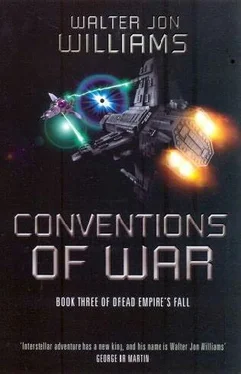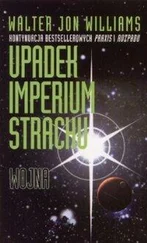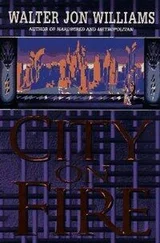Walter Williams - Conventions of War
Здесь есть возможность читать онлайн «Walter Williams - Conventions of War» весь текст электронной книги совершенно бесплатно (целиком полную версию без сокращений). В некоторых случаях можно слушать аудио, скачать через торрент в формате fb2 и присутствует краткое содержание. Жанр: Фантастика и фэнтези, на английском языке. Описание произведения, (предисловие) а так же отзывы посетителей доступны на портале библиотеки ЛибКат.
- Название:Conventions of War
- Автор:
- Жанр:
- Год:неизвестен
- ISBN:нет данных
- Рейтинг книги:5 / 5. Голосов: 1
-
Избранное:Добавить в избранное
- Отзывы:
-
Ваша оценка:
- 100
- 1
- 2
- 3
- 4
- 5
Conventions of War: краткое содержание, описание и аннотация
Предлагаем к чтению аннотацию, описание, краткое содержание или предисловие (зависит от того, что написал сам автор книги «Conventions of War»). Если вы не нашли необходимую информацию о книге — напишите в комментариях, мы постараемся отыскать её.
Conventions of War — читать онлайн бесплатно полную книгу (весь текст) целиком
Ниже представлен текст книги, разбитый по страницам. Система сохранения места последней прочитанной страницы, позволяет с удобством читать онлайн бесплатно книгу «Conventions of War», без необходимости каждый раз заново искать на чём Вы остановились. Поставьте закладку, и сможете в любой момент перейти на страницу, на которой закончили чтение.
Интервал:
Закладка:
Dr. Xi had said Fletcher found his position a burden, that he worked dutifully to fulfill what was expected of him. He wasn’t an arrogant snob, according to Xi, he was just playing thepart of an arrogant snob.
Fletcher had been empty, Martinez thought, filling his hours with formal ritual and aesthetic pleasure. He hadn’t created anything; he hadn’t ever made a statue or a painting, he just collected them. He hadn’t done anything new or original with his command, he’d just polished his ship’s personnel and routines the same way he might polish a newly acquired silver figurine.
Yet he had suffered, apparently. Perhaps he had known all along how hollow his life had become.
Fletcher had sat where he was now sitting, and contemplated objects that other people considered holy.
Martinez decided he wasn’t going to figure Fletcher out tonight. He put the cocoa aside, brushed his teeth, and rolled beneath the covers.
FOURTEEN
Resistance, with instructions on building a partisan cell network, was distributed to the citizens of Zanshaa, and was shortly followed by essays on the manufacture of firebombs and plastic explosives, which was easy, and detonators, which were not.
“If you’re going to tell people to mess with stuff like picric acid,” Spence warned, “you’re going to have them blowing their fingers off.”
Sula shrugged. “I’ll tell them to be careful,” she said. It’s not as if she could look over their shoulders and tell them how to do it right.
She just wished she was enough of an engineer to provide diagrams of how to build firearms.
The Naxids had published sketches of the two Terrans observed fleeing from the scene of Lord Makish’s assassination. The pictures were composites generated by witnesses, and Sula suspected the Naxid school supervisor as the prime contributor.
Both images were male. Neither resembled Sula or Macnamara to any degree.
Sula wondered how badly she ought to be insulted. Her figure was slim but hardly boyish. Even in a worker’s overalls it should be clear enough that she was female.
She concluded that the Naxids were no better at telling Terrans apart than the Terrans were at distinguishing individual Naxids.
As she was sending the newsletter out in batches of a few thousand, she heard shouts and a crash on the street outside and stepped to the window. A black-haired Terran man had run through the street vendors in an attempt to evade police, but the police had caught him. They were Terran as well. As the man was marched away, Sula wondered if he was a criminal, a new-made hostage, or a loyalist bound for execution.
Others on the street watched as well, and as they watched with carefully controlled expressions, Sula could see the same question floating behind their hooded eyes. A new tension had entered the world. An arrest had once been something comparatively simple, and now it was fraught with a thousand new, dangerous implications, particularly if the authorities needed hostages in a hurry.
People in Riverside, when they weren’t working or sleeping, lived mostly on the streets because their prefabricated apartments were too cramped for themselves and their families. Their normal life had now become a calculation, necessitating a calculation of risks, whether a breath of fresh summer air was worth the chance of being round up and shot.
Everyone under the Naxids, she thought, was making that calculation now.
Within days Team 491 was making regular deliveries of cocoa, tobacco, and coffee to restaurants and clubs throughout the city. Aside from profit, the deliveries provided opportunities for gossip with the restaurant staff, and the staff overheard a great deal from their customers.
The operation promised enough money so that Sula’s company was able to buy their own delivery vehicle. It was a bubble-shaped truck with chameleon panels on the sides, and since advertising that drew electricity from the grid had been forbidden since the destruction of the ring, she was able to rent out the chameleon panels for advertising and turn even more profit.
Though their chances of overthrowing the Naxid regime seemed remote, Sula supposed that Team 491 could take justified pride in becoming highly successful entrepreneurs.
The team took no more action against the Naxids, though Sula found herself staring narrow-eyed at possible targets from the cab of the truck. We should dosomething, she found herself thinking.
Others acted without her. A group of students at the Grandview Preparatory School staged an unsuccessful ambush of a Naxid Fleet officer returning home on a train. Details were scarce in the official reports, but possibly they intended to beat the officer senseless and steal his firearm. A couple of the attackers were killed outright and the rest captured. Under interrogation, they confessed to being members of an “anarchist cell,” and apparently they named others, both fellow students and teachers, because there were a series of arrests.
The Grandview school was purged. The alleged anarchists were tortured to death on the punishment channel, and the students’ families shot.
Resistancemourned them as martyrs to true government and the Praxis.
A Cree delivering fish to a Grandview restaurant told Sula of a Naxid being killed by a mob, all this supposedly happening in a Torminel neighborhood called the Old Third. The Naxid had been chased down at night by a mob of nocturnal Torminel, and the next morning Naxid police surrounded the area, charged in, and shot down the inhabitants at random. Hundreds, according to the Cree, had been killed.
“Why haven’t I heard of this?” she asked. Sensational news like that should have spread through the city like a storm wind.
“They wouldn’t put it on the news.” The Cree’s musical, burbling accents were far too cheerful for his subject matter.
“Sensational news like that, it should be over the city in hours.”
The Cree turned his light-sensitive patches toward her. Sula could feel her internal organs pulsing to the subsonic throbs of his sonar.
“Perhaps it will be, inquisitive one,” the Cree said, “but the incident occurred only this morning. I heard the killing from my window.”
Heard, not saw. The Cree’s light-patches probably wouldn’t have made much sense of something going on at such a distance, but his broad, tall ears would have given him a clear enough idea of what was happening.
The Old Third was some distance away, on the other side of the city, but the restricted, computer-guided highways managed the distance in less than an hour. The truck approached through the Cree neighborhood adjoining, and there were pockmarks of bullets on the buildings, along with shattered windows and splashes of blood on the pavement. Sula decided it wasn’t a good idea to get any closer.
The rest she learned later, as death certificates were filed in the Records Office computer. The Naxid who had been killed by the mob was a sanitation worker who finished her shift in the wrong neighborhood. The police hadn’t killed hundreds, but around sixty.
The Naxids had next turned their attention to the local hospital, where they shot anyone they found in the emergency wards on the assumption that they’d been wounded in the earlier police action. It was a bad day for anyone to break a leg. Another thirty-eight were killed.
In the next issue ofResistance, Sula provided a partial casualty list-she couldn’t produce a full list without giving away her access to the Records Office. Melodramatic details spilled from her imagination: the parent who died in an unsuccessful attempt to shield her children, the angry shopkeeper holding the police off with a broom until riddled with bullets, the panicked civilians herded into a blind alley and gunned down, the bloody claw marks on the bricks.
Читать дальшеИнтервал:
Закладка:
Похожие книги на «Conventions of War»
Представляем Вашему вниманию похожие книги на «Conventions of War» списком для выбора. Мы отобрали схожую по названию и смыслу литературу в надежде предоставить читателям больше вариантов отыскать новые, интересные, ещё непрочитанные произведения.
Обсуждение, отзывы о книге «Conventions of War» и просто собственные мнения читателей. Оставьте ваши комментарии, напишите, что Вы думаете о произведении, его смысле или главных героях. Укажите что конкретно понравилось, а что нет, и почему Вы так считаете.











